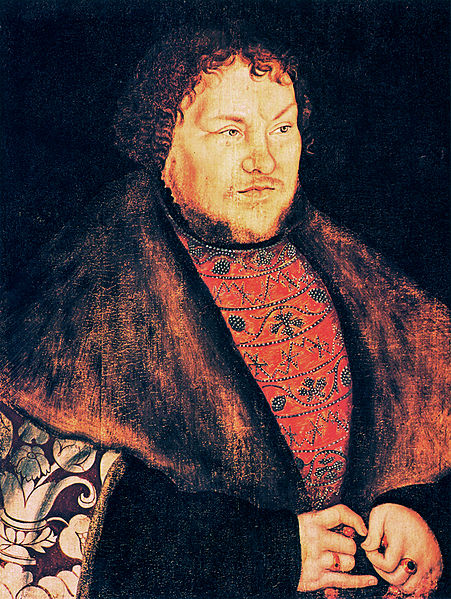<Back to Index>
- Astronomer Eise Jeltes Eisinga, 1744
- Writer Angela Anaïs Juana Antolina Rosa Edelmira Nin y Culmell (Anaïs Nin), 1903
- Prince Elector of the Margraviate of Brandenburg Joachim I Nestor, 1484
PAGE SPONSOR

Joachim I Nestor (21 February 1484 – 11 July 1535) was a Prince - elector of the Margraviate of Brandenburg (1499 – 1535). He was a member of the House of Hohenzollern and nicknamed after the Nestor of Greek mythology.
The eldest son of John Cicero, Elector of Brandenburg, Joachim received an excellent education under Dietrich von Bülow, Bishop of Lebus and Chancellor of Frankfurt University. He became Elector of Brandenburg upon his father's death in January 1499, and soon afterwards married Elizabeth of Denmark, daughter of John of Denmark. They had five children.
Joachim took some part in the political complications of the Scandinavian kingdoms, but the early years of his reign were mainly spent in the administration of his electorate, where by stern measures he succeeded in restoring some degree of order. He also improved the administration of justice, aided the development of commerce, and was a friend to the towns. On the approach of the imperial election of 1519, Joachim's vote was eagerly solicited by the partisans of King Francis I of France, and Charles of Burgundy. Having treated with, and received lavish promises from, both parties, he appears to have hoped to be Emperor himself; but when the election came he turned to the winning side and voted for Charles. In spite of this, however, the relations between the Emperor and the Elector were not friendly, and during the next few years Joachim was frequently in communication with Charles' enemies.
In the course of Hohenzollern power politics Joachim Nestor and his brother managed to get the latter, Albert of Mainz, first onto the sees of Magdeburg and its suffragan of Halberstadt, both prince - bishoprics also comprising also princely territories. Since prince - episcopal sees were so influential usually different candidates ran for them. So the candidate with the biggest influence, be it based on military power and/or financial capacities succeeded. A candidature could turn into a bribery competition, never knowing exactly how much competitors paid.
The involved expenditures, as far as they exceeded one's own potential, were usually advanced by creditors and had then to be recovered by levying dues from the subjects and parishioners in the thus gained prince - bishoprics and dioceses. In 1514 the Hohenzollern scored a coup and succeeded in buying for Albert the very influential Prince - Archbishopric - Electorate of Mainz, providing the Hohenzollern two of overall seven electoral votes in imperial elections, and many suffragan dioceses to levy dues.
According to canon law Albert was too young to hold such a position and since he would not give up the archiepiscopal see of Magdeburg, to terminate the accumulation of archdioceses, prohibited by canon law, the Hohenzollern had to defray even higher briberies at the Holy See, exhausting their own means, therefore incurring debts with the Fuggers.
For the recovery of the enormous expenditures Albert's mediators stipulated with the Holy See that the latter would allow Albert to sell indulgences to the believers in his archdioceses and their suffragans. The sales proceeds had to cover (1) the amortisation and servicing of the debts, (2) a share for the Holy See, for allowing this squeezing of the believers, (3) the expenditure paid from the Hohenzollern's own pockets, and (4) the charges involved with the sales.
The neighbouring Electorate of Saxony had also bidden for the See of Mainz, however, failing. So the Saxon elector Frederick the Wise had debts of his own, but no see and privilege to sell indulgences to recover his expenditures. Frustrated he forbade selling indulgences in his electorate and allowed Martin Luther to polemise against indulgences.
Joachim Nestor on the contrary, became best known as a pugnacious adherent of Roman Catholic orthodoxy, who needed the sales of indulgences and the necessary intimidation of the believers, in order to recover his expenditures. Joachim Nestor's brother, Archbishop Albert was the initial object of Luther's attack. He urged upon the Emperor the need to enforce the Edict of Worms, and at several diets was prominent among the enemies of the Reformers.
A patron of learning, Joachim Nestor established the Viadrina university of Frankfurt (Oder) in 1506. He promoted Georg von Blumenthal, the "Pillar of Catholicism", as Chancellor of Frankfurt University, Bishop of Lebus and a Privy Counsellor. He was among those who met at Dessau in July 1525, and was a member of the league established at Halle in November 1533. But, against his will, his wife, like her brother King Christian of Denmark, became Lutheran, and in 1528 fled for safety to Saxony. He had the mortification of seeing Protestantism also favoured by other members of his family. He died at Stendal in 1535.